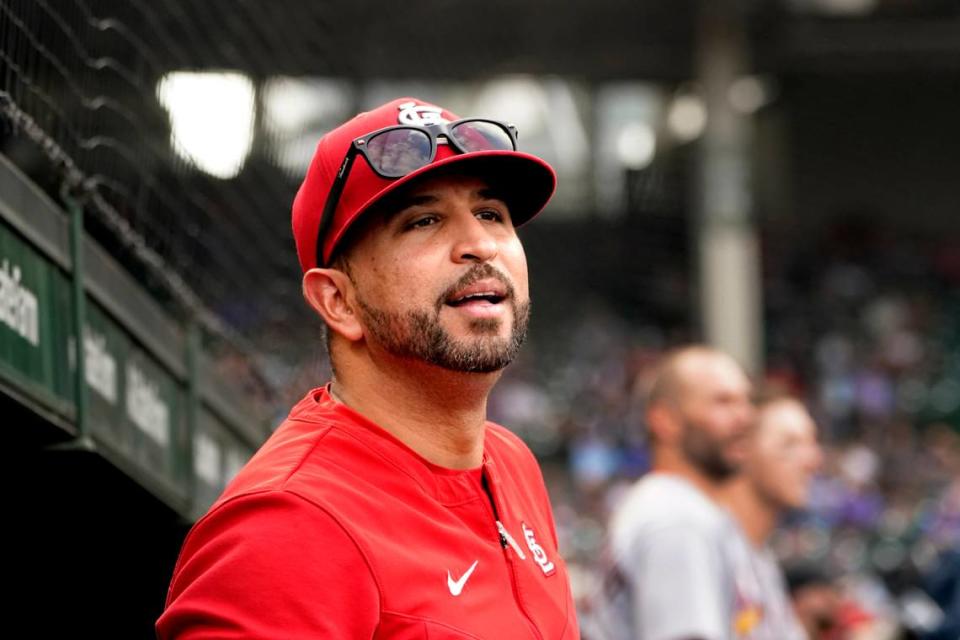New St. Louis Cardinals pitching coach earning high praise from hurlers in early going
- Oops!Something went wrong.Please try again later.
- Oops!Something went wrong.Please try again later.
- Oops!Something went wrong.Please try again later.
- Oops!Something went wrong.Please try again later.
- Oops!Something went wrong.Please try again later.
One of the great white whales of Cardinals player development has been the building and growth of a pitching lab designed to maximize the organization’s use of modern methods and technology, guaranteeing they don’t fall far behind the industry curve.
Ground on the building isn’t set to break until after spring training. Ground for the development, the team hopes, has been softened with the promotion of Dusty Blake to pitching coach.
Mike Maddux’s short-lived decision to step back from the daily grind of a Major League schedule opened the door to Blake’s promotion, and early returns from the pitchers in his charge have been raves.
“He’s a lot more in tune with everything and a very bright mind, as far as baseball goes, in general, and then the analytic stuff he brought in,” Cardinals starter Dakota Hudson said. “It was something that changed my view of the game itself.”
Pains have been taken to praise the work Maddux did with the pitching staff in the past several years, but the developments in the industry haven’t been as widely embraced in St. Louis as with other teams. Understanding the proper application of data — and making sure players are comfortable buying into it — is a necessary step in building out a modern staff.
“I think we often categorize coaches, and we put them into two buckets, and that’d be like an old school bucket and a new school bucket,” manager Oliver Marmol said. “I can debate and argue that all day long, but at the end of the day, if we just use those two buckets, I think he’s a great blend of both where he’s very aware of the modern game and how to use it, but also how to simplify and make it actionable.”
Blake joined the Cardinals as a Major League pitching strategist prior to the 2021 season, and in doing so, took his first step into professional ball. He previously was the pitching coach at Duke University and established himself as an industry leader in modern techniques and development through his Pitching360 program.
In that capacity, he hosts an annual conference in North Carolina where industry leaders gather to share methods, techniques, and research. Now, as the Cardinals’ pitching coach, he has the opportunity to apply that knowledge base in depth.
Part of that, in addition to pitch design, is applying a modern understanding of biomechanics and changes that can be made in a pitcher’s delivery to keep them healthy. The act of pitching is unnatural and bad for an arm. Pitchers, inevitably, break. Keeping them on the field represents a competitive edge that’s sought broadly in baseball.
“If you don’t keep guys healthy, you lose your job in college, because you have such a short window,” Steven Matz said, acknowledging he was only able to make 10 starts in his first season after signing in St. Louis. “That was something that he really seems like he’s figured out well.”

‘I’m excited to hear what he has to say’
There’s no Major League team still holding out on every aspect of the technological developments which have swept through the game. Slow motion cameras, tracking radar, and algorithmic scouting are now commonplace; nearly as many pitchers now know how to use a Rapsodo as a rosin bag.
What limits teams instead is the ability of their coaches to communicate the necessity of those innovations, and the extent to which they can be naturally integrated into already existing structures. There’s a commonly understood adage about old dogs and new tricks, and Blake’s role will be in part to convince his pitchers that the new things he’s introducing are, in fact, part of what they’ve been doing all along.
“For me, I like to simplify things more,” Matz said. “I think Dusty has a really good approach and understanding that and understanding each individual and what they need as far as that goes.
“In talking to him, I’m excited to hear what he has to say. But also I know that he’s not so strict on what he sees. He understands that there is an emotional aspect of the game and a competitive aspect to the game. It’s not just all analytics.”
Old school communicator
There is no perfect measurement that unlocks the skeleton key to pitching success. Coaching is repetition, and drilling down concepts that allow the staff to exceed expectations will be an essential part of allowing Blake to provide proof in the pudding of his methodology.
The investments in people, infrastructure and time are significant. Confidence is high they’ll provide significant payoffs.
“You can also categorize him as an old school communicator and how he gets this kind of modern game being translated to the player to be able to actually deliver it on the field,” Marmol said. “He’s a great blend of both, and that’s why it’s valuable to me as far as making him the number one here.”

